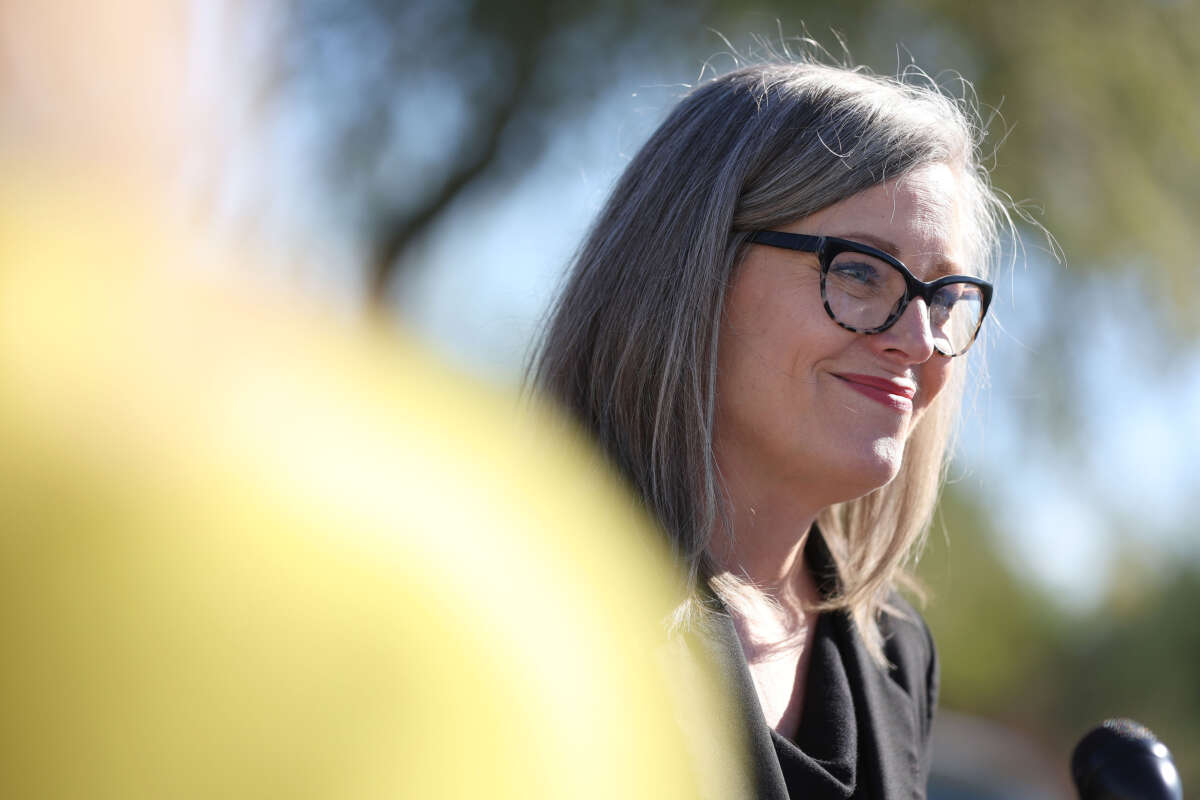On Thursday, Arizona Gov. Katie Hobbs (D) signed a bill into law that repeals a 160-year-old anti-abortion statute that was first enacted when the state was just a territory.
The 1864 law was re-implemented last month after the state Supreme Court ruled that it was still enforceable. The law forbids abortion at any stage of pregnancy and makes no exceptions for rape, incest, or to protect a pregnant person’s health. The law only allows abortion in cases when a person’s life is at risk — a standard that is rarely implemented in practice due to practitioners’ fears of being prosecuted by the state.
The new bill repeals the 1864 statute and reinstitutes a 15-week abortion ban that had existed prior to the state Supreme Court’s ruling.
“In the weeks since [the state Supreme Court ruling], we’ve seen women and other care providers suffer from the chaos and confusion caused by this ruling,” Hobbs said in her remarks prior to signing the bill into law, saying that she’d heard from doctors who were “unsure if they would wind up in a jail cell for simply doing their job,” and from residents who told her “they didn’t know if it was safe to start a family here in Arizona.”
She expressed pride in being able to sign the bill “and provide a moment of relief for Arizonans.” But, perhaps alluding to the continued restrictions that would exist in spite of the repeal (and a likely ballot measure in the fall), Hobbs added: “We still have work to do.”
Hobbs signed the bill a day after it was approved by the state Senate. Although Republicans control that state legislative chamber by a 16-14 majority, two Republican lawmakers, Sens. Shawnna Bolick and T.J. Shope, joined with every Democrat to pass the measure.
Bolick justified her vote by sharing her own experience with an unviable pregnancy, while Republicans who voted against the bill used apocalyptic comparisons to express their dismay.
“Today feels like 9/11,” state Republican state Sen. David Gowan.
“God is watching,” added GOP state Sen. David Farnsworth.
Democrats celebrated the passage of the bill but noted that more action was needed, saying that Republicans would likely try to enforce more draconian anti-abortion measures in the future.
“While I celebrate the community’s work to achieve this repeal and my Democratic colleagues for their continued unity and commitment to responsible leadership in Arizona, our fight for a better collective future is just beginning,” said state Sen. Anna Hernandez (D). “The Republican leadership in Arizona has shown that they are unwavering in their desire to strip us of our rights, our voices, and our vote.”
Due to legislative rules, the new law won’t take effect for at least a few months, and the older, near-total abortion ban will be enforced in the meantime. Unless otherwise noted in the statutes themselves, state laws take effect 90 days after the legislative session ends, and with budget negotiations just starting, that could mean that the territorial-era law, which goes into effect in June, could last until August or longer.
Local county district attorneys, as well as state Attorney General Kris Mayes, promised to use every tool at their disposal to block enforcement of the 1864 law.
“Without an emergency clause, my team will continue to work with nationwide subject matter experts on what will be our next move in the courts,” said Pima County Attorney Laura Conover.
“The people of Arizona may still be subjected to the near-total abortion ban for a period of time this year. Rest assured, my office is exploring every option available to prevent this outrageous 160-year-old law from ever taking effect,” said Mayes.
Others have noted that the 15-week ban is still dangerously restrictive. The law allows abortion up to 15 weeks but makes no exceptions for rape, incest or long-term health problems that could result from pregnancy complications.
The limitations of the 15-week ban mean that passage of an abortion rights constitutional amendment — which is likely to appear on the state ballot in this fall’s elections — is still very much needed, advocates said.
“Nothing has changed about the dire need for the Arizona Abortion Access Act,” said a statement from Arizonans for Abortion Access, the group that’s leading the movement to pass the amendment in November.
The group added that:
The only option to prevent new bans is to qualify and pass the Arizona Abortion Access Act, a Constitutional amendment ensuring access to abortion that will finally take decision making power away from politicians and put it where it belongs: in the hands of Arizona patients, our medical providers and our families.
If successful, the ballot measure would ensure abortion up to the point of fetal viability, usually understood to be around 22-25 weeks of pregnancy. Beyond that time frame, the law would also protect the right to abortion care in cases of rape, incest, and in situations where a person’s life or physical or mental health is at severe risk.
We have 6 days to raise $41,000 — we’re counting on your support!
For those who care about justice, liberation and even the very survival of our species, we must remember our power to take action.
We won’t pretend it’s the only thing you can or should do, but one small step is to pitch in to support Truthout — as one of the last remaining truly independent, nonprofit, reader-funded news platforms, your gift will help keep the facts flowing freely.
